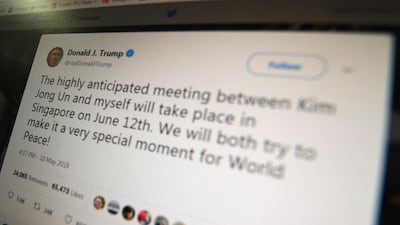Donald Trump can’t block critics from following his Twitter account, a federal judge ruled, in a decision that opens the United States' president's favourite communication forum to uncensored commentary from political opponents.
In a 75-page ruling that rejects the president’s argument that he has a First Amendment right to pick with whom he associates and not to engage with others, a Manhattan federal judge said the section of his personal account with the reply button is a public forum. Blocking users on the basis of political speech is a violation of their free-speech rights, the court said.
“This is a groundbreaking decision,” said Clay Calvert, a First Amendment expert who teaches at University of Florida college of journalism and communications. “It establishes that social media accounts operated by a government official – even the president of the United States – constitute a public forum.”
While it’s not the only ruling that a public official can’t block criticism on social media, it’s the first to apply the concept to the president’s @realDonaldTrump feed. Mr Trump uses the Twitter account for policy and diplomatic announcements as well as to lash out at the media and special counsel Robert Mueller’s investigation.
“No government official – including the president – is above the law,” wrote US District Judge Naomi Reice Buchwald in Manhattan.
Judge Buchwald’s decision came in a case brought last year by the Knight First Amendment Institute at Columbia University on behalf of seven Twitter users who were blocked by Trump after replying to his tweets.
Among them was Rebecca Buckwalter, a writer and political consultant who was blocked in June after responding to Mr Trump’s tweet that he would have had “ZERO chance winning WH” if he had relied on the “Fake News.”
Ms Buckwalter had replied: “To be fair you didn’t win the WH: Russia won it for you.”
The judge said Mr Trump couldn’t suppress such responses. Blocking detractors is more than just ignoring their comments, she said. Instead, doing so limits their “right to speak in a discrete, measurable way”.
By blocking users, the president prevented them from speaking to others on the reply thread, not just to him, the judge said. The president has more than 52 million followers on Twitter.
“This case requires us to consider whether a public official may, consistent with the First Amendment, ‘block’ a person from his Twitter account in response to the political views that person has expressed, and whether the analysis differs because that public official is the president,” Ms Buchwald said. “The answer to both questions is no.”
The Department of Justice said in a statement that it “respectfully” disagrees with the ruling and is considering how to proceed.
“The president’s practice of blocking critics on Twitter is pernicious and unconstitutional, and we hope this ruling will bring it to an end,” Jameel Jaffer, the Knight Institute’s executive director, said in a statement.
The judge declined to order Mr Trump to unblock users, saying her decision should be sufficient to force a change in behaviour.
Twitter, which wasn’t a party to the lawsuit, declined to comment.
The president isn’t the first politician to face resistance for blocking critics from social media. In July, a federal court in Virginia said the chair of a county board of supervisors had violated the First Amendment rights of a constituent by blocking him from the county’s Facebook page.
In another case, four Maryland residents sued Governor Larry Hogan, claiming he censored them by deleting their comments and blocking them from his Facebook page because they didn’t agree with his views. The case settled after Mr Hogan adopted a new social media policy.
Kentucky governor Matt Bevin won an initial court round this March in a lawsuit which alleges he violated free-speech rights by blocking people from his Facebook and Twitter accounts. A federal judge denied a request for a preliminary court order that would’ve stopped the governor from blocking anyone. The judge said the governor wasn’t suppressing speech but “merely culling his Facebook and Twitter accounts to present a public image that he desires.”

